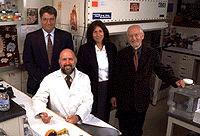Kentucky and Pittsburgh University Researchers Have Developed Effective Horse Flu Vaccine
Kentucky and Pittsburgh University Researchers Have Developed Effective Horse Flu Vaccine

The American horse industry finally has an effective vaccine to deal with equine influenza, thanks to the combined research and testing efforts of a team of scientists from the University of Kentucky and the University of Pittsburgh.
The group has developed the first modified live virus equine influenza virus vaccine to be introduced in the United States. The vaccine has been put through a rigorous testing procedure and has produced dramatic results, especially when compared with conventional killed, injectable vaccines.
The vaccine has been licensed by the USDA and will be distributed by the Heska Corporation under the brand name of Flu Avert I.N. Vaccine.
Dr. Tom Chambers and Dr. Robert Holland from the University of Kentucky College of Agriculture's Veterinary Science Department identified the wild virus types that were currently circulating in this country's horses and also conducted some of the safety and effectiveness trials.
Dr. Patricia Whitaker-Dowling and Dr. Julius Youngner, virologists from the University of Pittsburgh's School of Medicine, took the wild type virus found by Chambers and developed the live vaccine.
The horse flu bug is a major player in equine industry because, like its counterparts that affect humans, it causes millions of dollars of down time.
"It is a problem that can knock a horse out of the race or training regime for one or two months," noted Dr. Chambers. "Young horses are more prone to get the disease and they may get derailed from an important portion of the first training season."
"Practitioners have long been frustrated by the performance of available equine flu vaccines, " said Dr. Chambers.
According to the results of extensive safety and effectiveness trials, this new form of vaccine is safe and has long-lasting results.
Challenge trials indicated that a single dose of the live vaccine provides complete protection for three months and significantly reduces clinical signs for up to one year after administration. The Heska Corporation recommends that the vaccine be used on a semiannual basis. Horses subjected to additional stress, travel, competition or exposure can receive the vaccine at more frequent intervals.
The vaccination procedure is also painless. A specially designed nasal applicator is used for both mixing the diluent with the vaccine and for administration. The live virus vaccine produces an immune response in the nasal passages of the horse which stops the disease process at the site of infection.
"The inherent problem with injected killed virus vaccines is that they don't produce a broad immune response," noted Dr. Chambers. "A live vaccine does a better job of stimulating all the different defense mechanisms of the body that help to fight virus attacks."
"I think this vaccine is very good," said Dr. Dowling. "It is much better that what is available on the market now and I think it is really going to change this disease situation in the United States."
The research team is very certain the new vaccine will live up to its initial success. Studies involving more than a thousand horses in university and private practitioner sites across the country were used to test the vaccine.
The vaccinated horses were exposed to extremely virulent strains of the most common equine flu found in the United States and then carefully examined for clinical signs of infection.
"This vaccine is the most throughly tested equine flu vaccine that I have ever seen," said Dr. Holland. "It raises the bar in the way vaccines will be tested in the future here in the United States."
Another exciting aspect of the vaccine's development was the coordination of the research and development efforts between two universities such as UK and Pittsburgh.
"We had been talking about this flu problem for years with Dr. Chambers, but the real work began back in 1994, " said Dowling. "It took about a year of that time to develop the live vaccine."
"Everything starts with the scientists," said Dr. Youngner. "And there is nothing more satisfying than to be working on a scientific problem that you can solve not only at the scientific level, but used at a practical level to do some good in the world."
Youngner speaks from a long experience with success. The University of Pittsburgh professor was also an integral part of the research team that helped Jonas Salk to develop a vaccine for polio.
"We were surprised at how smoothly the clinical trials went. Usually in any scientific study there are more failures than successes," said Dowling. "This particular search for a good vaccine was smooth sailing from beginning to end."
With the USDA licensing process now completed, the research team will be presenting their findings at upcoming professional meetings and seminars.
The Heska Corporation underwrote much of the research effort. It was Heska's first product for the equine health care market. The Fort Collins, Colorado-based biotechnology company firm is a well known manufacturer of companion animal products.
(30)
